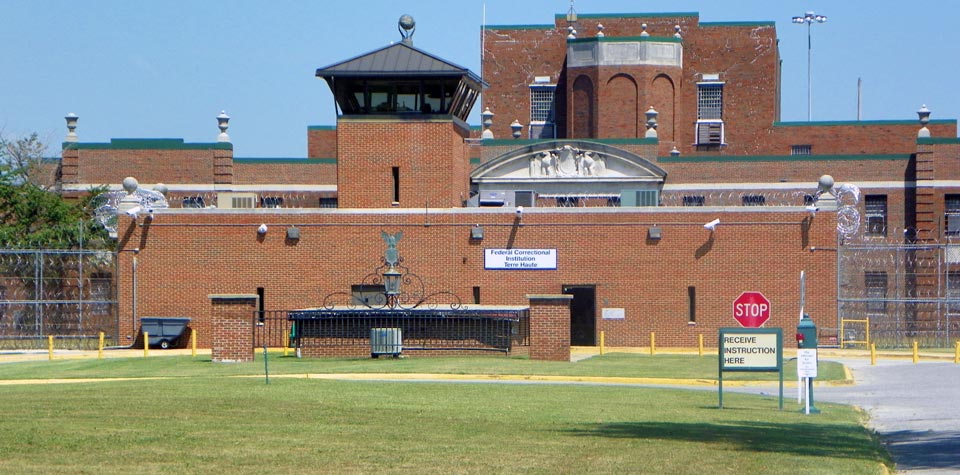
- Details
- By Levi Rickert & Tamara Ikenberg
TERRE HAUTE, Ind. — Barring a last-minute presidential pardon, a Navajo citizen will be put to death on Wednesday evening, marking the first time the federal government has executed a Native American man for a crime committed against another Native American on a tribal reservation.
Navajo citizen Lezmond Mitchell, the only Native American on federal death row, is scheduled to be executed by lethal injection on Wednesday, Aug. 26, at 6 p.m. (EDT) at the federal correctional facility in Terre Haute, Ind. Mitchell was sentenced to death for the gruesome 2001 murders of a 63-year-old Navajo woman and her 9-year-old granddaughter.
Attorneys for Mitchell tried to buy time for him by filing a lawsuit Tuesday against Attorney General William Barr and other government officials. On Wednesday morning, a federal judge denied Mitchell’s request for a temporary restraining order.
On Tuesday, the Supreme Court denied Mitchell's request for a stay of execution.
Influential Native American leaders are speaking out about the federal government’s decision to go forward with the execution, arguing that it denies the wishes of the Navajo Nation and betrays tribal sovereignty.
 Shannon Keller O’Loughlin (Choctaw), executive director of the Association on American Indian Affairs. Courtesy photo.“If the Native Nation wishes for a stay of execution, it should be given,” Shannon Keller O’Loughlin (Choctaw), executive director of the Association on American Indian Affairs said. “Though we are not hopeful that Mitchell’s execution will be stayed indefinitely, the concern is whether the Native Nation gave its free, prior and informed consent for the punishment, considering the victims and the perpetrator were Indian.”
Shannon Keller O’Loughlin (Choctaw), executive director of the Association on American Indian Affairs. Courtesy photo.“If the Native Nation wishes for a stay of execution, it should be given,” Shannon Keller O’Loughlin (Choctaw), executive director of the Association on American Indian Affairs said. “Though we are not hopeful that Mitchell’s execution will be stayed indefinitely, the concern is whether the Native Nation gave its free, prior and informed consent for the punishment, considering the victims and the perpetrator were Indian.”
The situation is emblematic of the U.S. Government’s consistent failure to recognize and accommodate Native governments, she said.
“Even if the federal law seemingly attempts to absolve the U.S. from considering the Native Nation’s position, there are stronger government-to-government concerns that the U.S. must always consider,” Keller O’Loughlin said. “To do otherwise is just another symptom of institutional racism, and the failure of our political system to deal with the needs and interests of Native governments equal to their own.”
The leadership of Navajo Nation has been personally involved in the case. Earlier this month, President Jonathan Nez left Navajo Nation for the first time since the pandemic erupted, to visit Washington D.C. where he and Mitchell’s lawyers petitioned the U.S. Pardon Attorney on Mitchell’s behalf.
The Native American Rights Fund (NARF) and its allied organizations have also lent their voices to the controversial cause. Last week, in a letter dated August 20, NARF directly asked President Trump for clemency, strongly urging him to “commute the sentence of Lezmond Mitchell, a member of the Navajo Nation, from the death penalty to life in prison without the possibility of parole.”
The letter also outlined the ways in which the sentence oversteps the rights of the Navajo Nation Government, and encouraged the President to recognize tribal governments as sovereign entities.
“His death sentence was imposed for a crime that occurred against Navajo Nation citizens on Navajo Nation reservation lands, and the Navajo Nation has consistently opposed the death sentence in this case...When certain major crimes, such as murder, are committed in Indian country between Indians, the death penalty can only apply when the tribal nation whose land the crime occurred on has chosen to “opt-in” to have the death penalty apply.The Navajo Nation has never “opted in” to the federal death penalty and has consistently opposed capital punishment on cultural and religious grounds... We urge you to give deference to the Navajo Nation—one sovereign to another.”
The letter was signed by John Echohawk, founder and executive director of NARF; Cassandra Stubbs, director of the Capital Punishment Project for the ACLU; Norman L. Reimer, executive director of the National Association of Criminal Defense Lawyers; and Gary Mitchell, president of the ACLU of New Mexico.
On Tuesday, Native American lawyers, journalists, and activists also took to social media to express their opinions on the execution.
Ruth Hopkins, a Dakota/Lakota Sioux writer and tribal attorney, has been addressing the issue regularly.
Tomorrow the Trump administration plans to execute a Navajo man without the legally required consent of his Tribe. Capital punishment goes against Navajo spiritual beliefs. If it happens it will set a deadly precedent for Tribes. The government is still killing Natives. #Mitchell
— Ruth Hopkins ⚡️❤️⚡️ (@Ruth_HHopkins) August 25, 2020
Cherokee writer and advocate Rebecca Nagle, who hosts the #ThisLand podcast about Native land rights, and writes for The Washington Post and Huffington Post, also weighed in.
Sovereignty is sovereignty, whether or not you agree with the outcome—in this case Navajo Nation’s right to prevent the execution of its citizens.
Respecting sovereignty when you agree with a tribe, & not respecting it when you don’t agree is what we call colonialism Rebecca Nagle (@rebeccanagle) August 25, 2020
Help us defend tribal sovereignty.
At Native News Online, our mission is rooted in telling the stories that strengthen sovereignty and uplift Indigenous voices — not just at year’s end, but every single day.
Because of your generosity last year, we were able to keep our reporters on the ground in tribal communities, at national gatherings and in the halls of Congress — covering the issues that matter most to Indian Country: sovereignty, culture, education, health and economic opportunity.
That support sustained us through a tough year in 2025. Now, as we look to the year ahead, we need your help right now to ensure warrior journalism remains strong — reporting that defends tribal sovereignty, amplifies Native truth, and holds power accountable.
 The stakes couldn't be higher. Your support keeps Native voices heard, Native stories told and Native sovereignty defended.
The stakes couldn't be higher. Your support keeps Native voices heard, Native stories told and Native sovereignty defended.
Stand with Warrior Journalism today.
Levi Rickert (Potawatomi), Editor & Publisher
